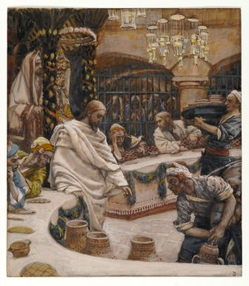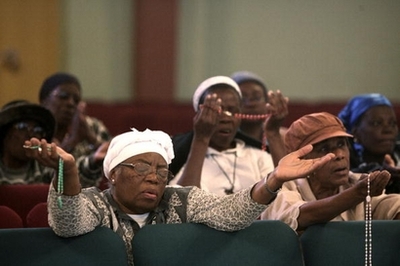On our refrigerator at home, there’s a picture that was taken about 10 years ago at the very spot where, tradition tells us, this episode of the gospel took place.
The picture shows my wife and me, inside the large church in Cana, in Galilee. We’d gone there on a pilgrimage. Cana today is teeming with tourists. Buses park along the narrow streets. You see people with fanny packs and cameras wandering the roads. People go there every day to tour the sites, renew wedding vows and and to see replicas of the large vats, similar to the ones used at the wedding. Gift shops sell postcards, wedding blessings and even specially labeled bottles of wine.
 Cana is a different place from the town Jesus would have known 2,000 years ago. But in a way, it is a living testament to the gospel story we just heard. Because, at its heart, this gospel episode is ultimately about change. Transformation. Conversion. It tells us, dramatically, about how the ordinary became extraordinary, how water became wine, all because of an encounter with Christ.
Cana is a different place from the town Jesus would have known 2,000 years ago. But in a way, it is a living testament to the gospel story we just heard. Because, at its heart, this gospel episode is ultimately about change. Transformation. Conversion. It tells us, dramatically, about how the ordinary became extraordinary, how water became wine, all because of an encounter with Christ.
In fact, the miracle of this gospel is the miracle of the Christian life – the beautiful reality that we can be changed by Jesus Christ.
We are water. But we can become wine. And it all begins with listening, and following.
“Do whatever he tells you,” Christ’s mother says – and in that moment you will find every catechism, every commandment, boiled down to a simple phrase. Significantly, it’s the last time Mary speaks in any of the gospels. But she doesn’t need to say any more. That instruction says it all – especially about the importance of obedience, and the transformative power of grace.
Christ’s grace makes the impossible possible. It transforms sinners into saints. It converts tax collectors and fishermen into apostles and preachers and popes. Christ makes the mundane… a miracle.
From the water of our lives…he makes wine.
Of course, wine is more than just a nice addition to a meal. Consider what will happen to wine at this altar in just a few moments. At the table of the Lord, it becomes the Lord. All of which suggests that, to be changed by Christ, to become wine, is to share not only in his grace; it is to share in his passion as well.
And this week, no place is experiencing that more profoundly, I think, than Haiti.
Last week, Archbishop Timothy Dolan was in Rome when he heard the news about the earthquake. He said that he went to St. Peter’s and prayed before the Pieta, the famous statue by Michelangelo of Mary cradling her dead son. “I realized,” the archbishop said later, “that Haiti is the broken, bloody body of Christ.”
So, on a morning where the scripture speaks to us of transformation, we remember that Haiti has also been transformed. The poorest country in the western hemisphere has been reduced to rubble. The cathedral has collapsed. The archbishop of Port Au Prince has been killed. The government offices are in ruins. A country has been transformed by tragedy.
And on this morning, I think, the gospel calls on each of us to effect another kind of transformation, within ourselves.
It summons us to be not merely watchers…but workers. Not just spectators…but servants — servants of the gospel, servants of one another, servants of the suffering people of Haiti.
As Mary held the lifeless body of her son in her arms, we are asked this day to hold Haiti. To love what is bloody and bruised and broken.
This Sunday, in churches across the country, there will be special collections for Haiti. You have seen the pictures. You’ve read the stories. I don’t need to tell you how desperate the situation is. This is a moment when all of us are called upon to go beyond ourselves: to love the neighbor we do not know….to bind his wounds…to dry her tears.
We can do that with donations, of course. Millions have already given by text messages and credit cards. But we can also do it with something people often forget in this secular age.
We can do it with prayer.
If we do nothing else, we need to pray for the people of Haiti. Pray for the lost, the orphaned, the widowed, the helpless. Pray for the mother who was on CNN the other night. She lost all five of her children, and her family could only hold her while she screamed. Pray for the students who were killed at the seminary. Pray for the rescue workers who are facing a new nightmare every day – without power, without water, surrounded every hour of every day by the sounds and smells of death.
But pray as well that — through our sacrifice, and our prayer, and the good works of so many people around the world — Haiti may be transformed once more. The glorious words from Isaiah in today’s readings offer this consolation for a suffering world:
“No more shall people call you “Forsaken, ”
or your land “Desolate, ”
but you shall be called “My Delight, ”
and your land “Espoused.”
What was water…will become wine.
My mind goes back to the image Archbishop Dolan mentioned — the Pieta, a grieving mother holding in her arms her dead child. And I think of all the parents in Haiti who are doing that this week, and all who will do it in the days to come.
Yet: even in that most intense sorrow, the grief of Our Lady of Sorrows, cradling her child in her arms, we find hope. And we hold on to that hope for the people of Haiti.
Because despite everything, our faith assures us of this:
That the agony at the foot of the cross was not the end of the story.
There is, still to come, a resurrection.

